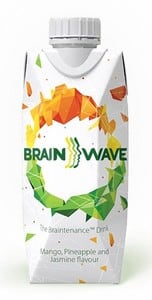The UK brand expects to produce its first production run at the end of August and claims extensive retail interest in its ‘Braintenance’ drink – which contains green tea extract, high EGCG, jasmine extract and caffeine – which it tells us could sell at around £2 ($3.4) per 330ml Tetra Pak.
Director Richard Baister tells BeverageDaily.com he thought recent comments from Canadean analyst Ronan Stafford on cognitive health drinks – that they forced brands to market a health need consumers prefer not to talk about – were “interesting”.
“When we originally put the product concept together in late 2013 we went with a slightly more conservative PET bottle, and snapped older models with the product,” he says.

‘People look after their bodies and diets, why not their minds as well?’
“We looked at this and said ‘hey, we’ve probably characterised this as heading towards a distressed purchase’,” Baister adds.
“So we pulled back before we launched – we had had a lot of retail interest from the announcement of the original launch – and decided to really get things right.
Brainwave went to work reinventing the brand, Baister explains, which involved “not making it all about Alzheimer’s and Dementia but about keeping a healthy mind”.
“Cognitive decline is characterised by these diseases in extreme cases – but people look after their bodies and their diets, surely they should look after their minds as well?
“We can’t get away from the fact that we’re targeting anyone with a brain. Because if you have a brain – you must want to look after it,” Baister says.
Big brands like Dei Monte muscle in on act
With brain health increasingly on the public agenda, Baister says even big brands (he cites a Dei Monte UK juice launch with vitamins for ‘alertness’ and ‘thinking') are muscling in on the act, albeit in a more allusive fashion.
Thus Brainwave will be pitched at everyone from students who, in his words “overdose on Pro Plus [caffeine tablets] and Red Bull”, to middle-aged people whose elderly relatives have suffered from dementia.
“They think, ‘OK, that’s given me a wakeup call. What can I do in terms of my lifestyle to reduce my chance of developing this?’” Baister says.
“Our market research also showed that mid-30s professionals – doctors, lawyers, accountants, are also very keen. They’ve got a lot going on and may be starting to notice that they don’t remember as well as did 5-10 years before,” he says.
“That may be nothing to worry about – but the drink gives them comfort and they’d rather drink it over alternatives, as a sugar-free option in a relatively small adult soft drinks segment.”
What will consumers feel when they drink Brainwave?
Functional claims are all very good, but the success of the energy segment is based upon a clear consumer feeling – namely that caffeine-based drinks work: spur alertness and boost energy levels.
What benefits will people feel when they drink Brainwave?
“I think the biggest benefit is reassurance and peace of mind that you’re trying to do the best you can for your body. That’s all that anyone can ask,” Baister says.
He insists the brand is backed by published science worldwide – the Brainwave website refers to 20 studies – that supports the role the drink’s ingredients play in reducing cognitive degradation.
“For most Western consumers it would be inconvenient, even a massive burden, to take these ingredients in, unless they were presented in a convenient and enjoyable way not present in the diet we have,” Baister says.
Functional drinks need to hone in on one benefit
Understandably, Baister is cagey when asked about Brainwave’s precise formulation – but says L-Theanine, high-dose EGCG and caffeine (about as much as a low-dose coffee) are central to it.
“The compound itself is more important than any individual ingredient, partly due to the permeability of the brain cells. It’s not typically a highly permeable part of the body,” he adds.
Speaking more generally about functional beverages, Baister says he thought it was vital that a product focused on one specific benefit, and also insists that the drink tasted great.
Flavored with natural fruit extracts and sweetened with sucralose, it also dispenses with preservatives due to use of a carton, and he describes it as a “very easy-to-drink, in the same way that you’ll find any close-to-water product perhaps more drinkable than a heavy drinkable one”.
